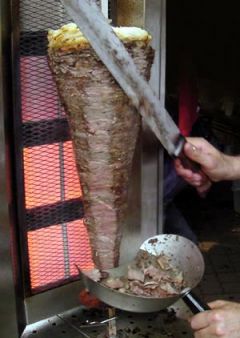How the humble kebab found itself at the centre of France's immigration row

Everyone knows that sport is war without the guns. Not quite as widely appreciated, though, is that cookery can be racism and xenophobia without the burning crosses and pointy hats.
At least, this is true in the land that gave us the very word 'cuisine', the home of Escoffier, Michelin and Marco Pierre White, and which introduced the world to baguettes, foie gras, ratatouille and cuisses de grenouilles.
Now, it might be argued that anyone happy to eat frogs' legs has got a colossal nerve objecting to any other foodstuffs whatsoever. However, that's what's happening in France. Four more kebab houses have opened in Blois, bringing the total to more than a dozen, and the far-right National Front party has exploded like an egg in a microwave. It said: "The historical centre of Blois, the jewel of French history, is turning into an Oriental city."
Who knew? But apparently, it's easier to say racist things about cookery than it is about people – though actually, nobody's fooled. This sort of thing is actually a coded attack on immigrants, a way of saying "We don't want you" while seeming to say "We don't want your food."
But you know: this is actually very heartening. Because the people opening these kebab houses aren't Muslim fifth columnists intent on subverting the loyalties of La Belle France. They're just business people who are selling a product – and the fact that the jewel of French history can support 12 of them means that they're on to a winner.
The truth is that the National Front is right to be worried. Cooking and eating stuff is one of the most fundamental human activities there is – even more than sex. Cooking expresses a huge amount about who people are, where they've come from and what they're like. Learn to appreciate someone's cooking and you learn to appreciate their character. Hey, they're like us, only hotter and more interesting!
Too many kebab shops and the nasty little prejudices that provide the core support for parties like the National Front will be broken down, bite by bite. Who, on this side of the Channel, would be foolhardy enough to start pronouncing against either kebab houses or the wildly exciting array of cookery from the sub-continent that has enriched and enthralled us over the last few decades? In Birmingham's Balti Triangle you can choose from 50 different restaurants. In the city centre there are more than 200, representing 27 different national styles. We love it. We know they come, originally at least, from all over the world, but we're glad they're here, we eat their food and so we become, in a subtle but ultimately decisive way, more human and much, much more tolerant.
In the Bible, food is a sacred thing. Isaiah (25:6) uses the great banquet as an emblem of God's ultimate promise-keeping provision for his people. Jesus uses it (Luke 14: 15-24) to illustrate God's invitation to come and be satisfied by him – and in John 13: 21-30, it's the one who breaks bread with him who betrays him.
Food brings us together. It helps us form bonds, it breaks down barriers – that's why the National Front hates kebab houses.
The more the merrier, I say. And while we're at it, let's have some Romanian and Bulgarian restaurants too. Let's see what the Roma can do, and the Poles, and the Hungarians.
Kebab theology. My mouth is watering.











